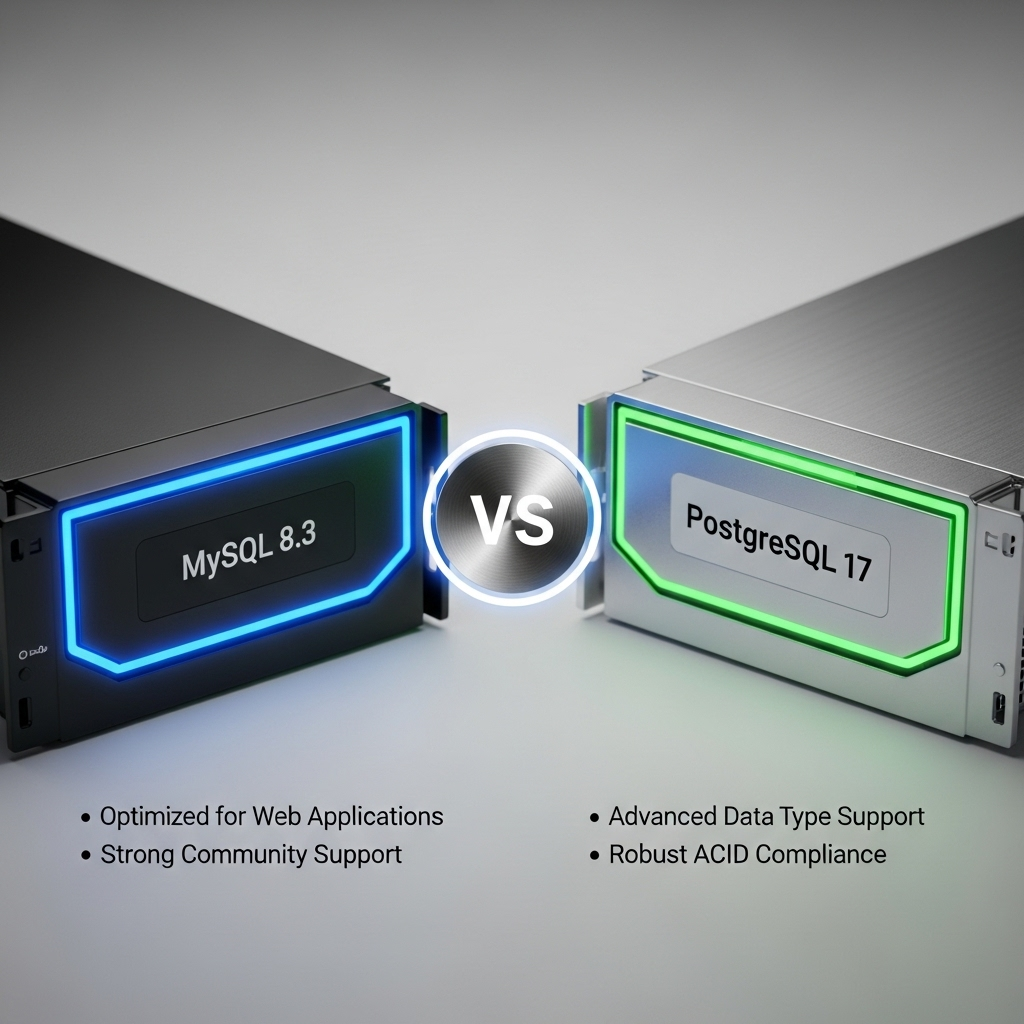Database systems: MySQL 8.3 vs. PostgreSQL 17
Quick Verdict
PostgreSQL excels in complex queries and data types, while MySQL offers strong security features and scalability options.
- PostgreSQL offers richer support for complex data types and advanced JSON querying capabilities.
- PostgreSQL's MVCC model handles concurrent write operations more gracefully.
- MySQL provides a flexible privilege and password system with host-based verification.

Key features – Side-by-Side
| Attribute | MySQL 8.3 | PostgreSQL 17 |
|---|---|---|
| Data Types Supported | numeric, date and time, string (character and byte), spatial, and JSON data types. | Numeric, character, date/time, boolean, arrays, UUID, JSON, hstore, geometric, enumerated, network address, ranges, XML, and composite types. |
| Scalability (Vertical and Horizontal) | Offers both vertical and horizontal scalability. MySQL Enterprise Scalability is available. | Vertical and Horizontal (distributing workloads across multiple servers via sharding and replication). |
| Replication Methods | Traditional replication using binary logs and GTIDs. Master-slave and multi-source replication. | Physical and logical replication. Streaming replication using primary-secondary configuration. |
| ACID Compliance Level | Complete ACID support. | ACID-compliant since 2001. Transaction isolation levels: Read Committed, Repeatable Read, and Serializable. |
| Concurrency Control Mechanisms | Multi-Version Concurrency Control (MVCC). | Multi-Version Concurrency Control (MVCC). |
| Security Features (Authentication, Authorization, Encryption) | Flexible privilege and password system with host-based verification. Supports encrypted connections using TLS. MySQL Enterprise Authentication. | Authentication, authorization, and encryption. |
| Supported Index Types | B-tree indexes, Hash indexes, Full-text indexes, Spatial indexes, Composite indexes. | B-tree (default), Hash, GiST, SP-GiST, GIN, and BRIN. |
| Full-Text Search Capabilities | Built-in full-text search capabilities. | Built-in full-text search capabilities. |
| JSON Support and Functions | Supports JavaScript Object Notation (JSON). | `JSON_TABLE()` function, extended JSON Path capabilities, `JSON_EXISTS`, `JSON_QUERY`, and `JSON_VALUE` functions. |
| GIS (Geographic Information System) Support | Offers GIS support. | PostGIS extension for geospatial data. |
| Extensibility (Stored Procedures, User-Defined Functions) | Supports plugins. | User-defined functions and stored procedures. |
| Cloud Deployment Options | Can be deployed in the cloud using IaaS or DBaaS options. | AWS, Google Cloud, and Azure (managed services and self-managed solutions). |
Overall Comparison
Data Types: PostgreSQL more extensive; Scalability: Both offer vertical and horizontal; JSON: PostgreSQL advanced functions
Pros and Cons
MySQL 8.3
Pros:
- No notable advantages reported.
Cons:
- No major disadvantages reported.
PostgreSQL 17
Pros:
- Richer support for complex data types like JSON and geospatial data compared to MySQL 8.3.
- Advanced JSON querying capabilities with functions like `JSON_TABLE()`.
- Supports the PostGIS extension for geospatial data.
- MVCC model handles concurrent write operations more gracefully than MySQL 8.3.
- Logical replication provides fine-grained control.
- Advanced query planner and optimizer.
Cons:
- Migrating from MySQL can present compatibility issues.
- Security Features: Information not available to compare security features between the two.
- Resource Requirements: Information not available regarding specific resource requirements.
- Licensing Costs and Support: Information not available regarding specific licensing costs.
- Limitations in High-Availability Environments: Information not available regarding specific limitations.
User Experiences and Feedback
MySQL 8.3
What Users Love
- No highlights reported.
Common Complaints
- No major complaints reported.
Value Perception
- No value feedback reported.
PostgreSQL 17
What Users Love
- No highlights reported.
Common Complaints
- No major complaints reported.
Value Perception
- No value feedback reported.